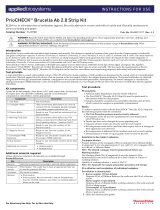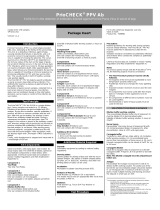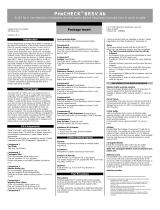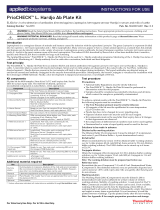Page is loading ...

PrioCHECK® Brucella Ab
ELISA for in vitro detection of antibodies against Brucella abortus and Brucella melitensis in serum and milk
of cattle, sheep and goats
5 plate kit for 440 samples
©Prionics AG
Version 1.0_e
For in-vitro veterinary diagnostic use only
Store at 5±3°C
Product No.: 7610400
Introduction
Brucellosis occur world wide and affects both humans
and animals. The disease is caused by bacteria of the
genus Brucella (Gram-negative coccobacillus). The
genus comprises 6 species: B. abortus (7 biovars), B.
melitensis (3 biovars), B. suis (5 biovars), B. ovis, B.
canis, B. neotomae and B. maris. The main reservoir
for B. abortus is cattle, the main reservoir for B. melit-
ensis are sheep and goats. Many serological tests
have been developed for the routine diagnosis of
brucellosis. Whatever test is used, one should be
aware that cross-reactions with other Gram-negative
bacteria such as Francisella tularensis, Campylobac-
ter, Salmonella, Pasteurella, Yersinia enterocolitica
0:9, Escherichia coli O:117 and 0:156 may occur.
After infection with B. abortus or B. melitensis, antibod-
ies of the IgM class appear and are followed by anti-
bodies in the IgG classes (IgG1 and IgG2). The Pri-
oCHECK® Brucella Ab detects antibodies of the IgG1
class in serum and milk and is a modification of the
test described by Bercovich et al. (1990). The test
meets the requirements of the EU directive 64/432.
The PrioCHECK® Brucella Ab can be used for: surveil-
lance and monitoring programs; individual and herd
diagnosis.
Test Principle
A microtiterplate is coated with sonicated and inacti-
vated Brucella abortus antigen. Serum samples or milk
samples are dispensed in the coated wells of a micro-
titerplate. Antibodies, directed against Brucella abortus
and Brucella melitensis, that are present in the test
sample, bind to the antigen during incubation. The
bound antibodies are detected using an anti-IgG
monoclonal antibody, conjugated to the enzyme
horseradish-peroxidase. Subsequently, the bound
conjugate is visualized by adding Chromogen (TMB)
Substrate. Color development measured optically at a
wavelength of 450 nm shows the presence of antibod-
ies directed against brucellosis.
Kit Components
Store kit at 5±3°C until expiry date. See kit label for
expiry date. The shelf life of diluted, opened or recon-
stituted components is noted below, where appropri-
ate. Chemical hazard data are available in section
“Safety Regulations and R&S Statements” (Appendix
II).
Component 1
Test Plate
Five Test Plates.
Component 2
Conjugate (30x)
(30x concentrated, dilute before use)
One vial contains 2.5 ml Conjugate.
Diluted conjugate is not stable, prepare just before
use.
Component 3
Dilution Buffer (5x)
(5x concentrated, dilute before use)
One vial contains 60 ml Dilution Buffer.
Shelf life of dilution buffer working solution: 5 hours at
22±3°C.
Component 4
Washing Fluid (200x)
(200x concentrated, dilute before use)
One vial contains 60 ml Washing Fluid.
Shelf life of washing solution: 1 week at 22±3°C.
Component 5
Reference Serum 1 (Ready-to-use)
One vial contains 0.5 ml of Reference Serum 1 (posi-
tive control).
Component 6
Reference Serum 2 (Ready-to-use)
One vial contains 0.5 ml Reference Serum 2 (negative
control).
Component 7
Reference Serum 3 (Ready-to-use)
One vial contains 0.5 ml Reference Serum 3 (weak
positive control).
Component 8
Chromogen (TMB) Substrate (Ready-to-use)
One vial contains 60 ml Chromogen (TMB) Substrate.
Component 9
Stop Solution (Ready-to-use)
One vial contains 60 ml Stop Solution.
Additional Kit Contents:
- 10 plate sealers
- Package Insert
- Certificate of analysis
Additional Material Required
General:
Laboratory equipment according to national safety
regulations.
Analysis of Results:
Plate Reader e.g. Multiscan EX or equivalent.
The reader has to have an appropriate filter set to read
the plates at 450 nm.
Incubation:
Microplate Incubator (reaching at least 50°C).
Optional:
Plate washer e.g. Tecan EIA Tray Washer or
equivalent.
Dummy plates. We advice U-bottom shaped
plates (Greiner, art. nr. 650101). However,
also other non-binding plates or tubes can be
used.
Test Procedure
Precautions
National guidelines for working with animal samples
must be strictly followed. The PrioCHECK® Brucella
Ab must be performed in laboratories suited for this
purpose.
Samples should be considered as potentially infectious
and all items which contact the samples as potentially
contaminated.
Chemical hazard data are available in section “Safety
Regulations and R&S Statements” (Appendix II).
Notes
To achieve optimal results with the PrioCHECK®
Brucella Ab, the following aspects must be considered:
The Test Procedure protocol must be strictly
followed.
All reagents of the kit must be equilibrated to
room temperature (22±3°C) before use.
Pipette tips have to be changed for every pipet-
ting step.
Separate solution reservoirs must be used for
each reagent.
Kit components must not be used after their
expiry date or if changes in their appearance are
observed.
Kit components of different kit lot numbers must
not be used together.
Demineralized or water of equal quality must be
used for the test.
SOLUTIONS TO BE MADE IN ADVANCE
Dilution buffer working solution
The concentrated Dilution Buffer (Component 3) must
be diluted 5 times (1 part Dilution Buffer + 4 parts
demineralized water). The total volume of dilution
buffer working solution that can be prepared is 300 ml.
Stability of dilution buffer working solution: 5 hours at
22±3°C.
Conjugate dilution
Prepare dilution of the Conjugate (30x) (Component 2)
in dilution buffer working solution.
For one plate prepare 12 ml, add 0.4 ml Conjugate
(30x) to 11.6 ml of dilution buffer working solution.
Note: The diluted conjugate must be prepared just
before use.
Washing solution
The Washing Fluid (200x) (Component 4) must be
diluted 1/200 in demineralized water and is sufficient
for a final volume of 12 liters of washing solution.
Stability of washing solution: 1 week at 22±3°C.
Note: see Appendix IV for sample preparation
procedure and storage
PRE-DILUTION OF REFERENCE SAMPLES
1.1 Prepare a 1:10 dilution of Reference Sera 1, 2
and 3 (Component 5, 6 and 7) in a dummy plate
by dispensing 90 µl of dilution buffer working so-
lution to the wells C1 up to H1. Add 10 µl of Ref-
erence Serum 1 to wells C1 and D1, 10 µl of
Reference Serum 2 to wells E1 and F1 and 10 µl
of Reference Serum 3 to wells G1 and H1.
PRE-DILUTION AND INCUBATION OF
INDIVIDUAL SAMPLES
Pre-dilution in dummy plate
2.1 Bovine samples 1:10 pre-diluted
Dispense 90 µl of dilution buffer working solution
to the wells and add 10 µl of bovine serum.
Sheep samples 1:5 pre-diluted
Dispense 80 µl of dilution buffer working solution
to the wells and add 20 µl of sheep serum.
Goat samples 1:2.5 pre-diluted
Dispense 60 µl of dilution buffer working solution
to the wells and add 40 µl of goat serum.
Package Insert

PrioCHECK
®
Brucella Ab
2.2 Shake the dummy plate gently.
Incubation in the Test Plate
3.1 Dispense 100 µl dilution buffer working solution
to wells A1 and B1 of the Test Plate (Component
1).
3.2 Dispense 90 µl of dilution buffer working solution
to wells C1 to H1 of the Test Plate.
3.3 Dispense 10 µl pre-diluted reference sera 1, 2
and 3 to the wells C1 till H1 of the Test Plate.
3.4 Serum sample
Dispense 90 µl of dilution buffer working solution
to the remaining wells and add 10 µl of the pre-
diluted sample sera to each of the correspond-
ing wells of the Test Plate.
Milk sample
Dispense 100 µl undiluted milk samples (individ-
ual or bulk) to the wells of the Test Plate.
3.5 Seal and shake the Test Plate gently.
3.6 Incubate the Test Plate 60±5 minutes at 37±1°C.
PRE-DILUTION AND INCUBATION OF POOLED
TEST SAMPLES
Pre-dilution in a dummy plate
2.1 Prepare a pool of 10 serum samples (bovine,
sheep or goat) by mixing 10 µl of each individual
serum in the dummy plate. Do not pool samples
of different species!
2.2 Shake the dummy plate gently.
Incubation in the test plate
3.1 Dispense 100 µl dilution buffer working solution
to wells A1 and B1 of the Test Plate (Component
1).
3.2 Dispense 90 µl of dilution buffer working solution
to wells C1 to H1 of the Test Plate.
3.3 Dispense 10 µl pre-diluted reference sera 1, 2
and 3 to the wells C1 till H1 of the Test Plate.
3.4 Pooled bovine serum samples
Dispense 90 µl of dilution buffer working solution
to the remaining wells and add 10 µl pooled se-
rum sample.
Pooled sheep serum samples
Dispense 80 µl of dilution buffer working solution
to the remaining wells and add 20 µl pooled se-
rum sample.
Pooled goat serum samples
Dispense 60 µl of dilution buffer working solution
to the remaining wells and add 40 µl pooled se-
rum sample.
3.5 Dispense 100 µl undiluted milk samples (individ-
ual or bulk) to the wells of the Test Plate.
3.6 Seal and shake the Test Plate gently.
3.7 Incubate the Test Plate 60±5 minutes at 37±1°C.
Continue with the following procedure for both
individual and pooled samples.
INCUBATION WITH CONJUGATE
4.1 Empty the Test Plate and wash the plate 6 times
with 200-300 µl washing solution. Tap the plate
firmly after the last wash cycle.
4.2 Dispense 100 µl of the diluted conjugate to all
wells.
4.3 Seal the Test Plate and incubate 60±5 minutes
at 37±1°C.
INCUBATION WITH CHROMOGEN (TMB) SUB-
STRATE
5.1 Empty the Test Plate and wash the plate 6 times
with 200-300 µl washing solution. Tap the plate
firmly after the last wash cycle.
5.2 Dispense 100 µl of the Chromogen (TMB)
Substrate (Component 8) to all wells.
5.3 Incubate the Test Plate for 15 minutes at
22±3°C.
5.4 Add 100 µl of the Stop Solution (Component 9)
to all wells.
5.5 Mix the content of the wells of the Test Plate.
Note: Start the addition of Stop Solution 15 minutes
after the first well was filled with Chromogen (TMB)
Substrate. Add the Stop Solution in the same order
and the same pace as the Chromogen (TMB) Sub-
strate solution was dispensed.
READING OF THE TEST AND CALCULATING THE
RESULTS
6.1 Measure the optical density (OD) of the wells at
450nm within 15 minutes after color develop-
ment has been stopped.
6.2 Calculate the mean OD450 blank (wells A1 and
B1).
6.3 Calculate the corrected OD450 of the Reference
Sera and test samples by subtracting the mean
OD450 blank.
6.4 Calculate the percent positivity (PP) of Refer-
ence Sera 2, 3 and of the test samples accord-
ing to the formula below.
The corrected OD450 of all samples are expressed as
percent positivity (PP) relative to the corrected mean
OD450 of Reference Serum 1 (wells C1 and D1).
corrected OD450 test sample
PP = --------------------------------------------------- x 100
corrected OD450 Reference Serum 1
RESULT INTERPRETATION
Validation criteria
7.1 The mean OD450 blank must be <0.150.
7.2 The corrected mean OD450 of Reference Serum
1 must be ≥1.000.
7.3 The percent positivity (PP) of Reference Serum
2 must be <45.
7.4 The percent positivity (PP) of Reference Serum
3 must be >45.
Note: Not meeting any of these criteria is reason to
discard the results of that specific test run.
Note: If the corrected mean OD450 of Reference
Serum 1 is below 1.000 possibly the Chromogen
(TMB) Substrate is too cold. In that case warm the
solution to 22±3°C or incubate up to 30 minutes.
If the corrected mean OD450 of Reference Serum 1 is
above 2.000 a shorter incubation period with the
Chromogen (TMB) Substrate is recommended.
Interpretation of the percent positivity
Bovine serum (individual or pooled) samples
PP <45% (negative)
Brucella antibodies are absent in the test sample.
PP >45% (positive)
Brucella antibodies are present in the test sample.
Bovine milk (individual or bulk) samples
PP <20% (negative)
Brucella antibodies are absent in the test sample.
PP >20% (positive)
Brucella antibodies are present in the test sample.
Sheep serum (individual or pooled) samples
PP <30% (negative)
Brucella antibodies are absent in the test sample.
PP >30% (positive)
Brucella antibodies are present in the test sample.
Goat serum (individual or pooled) samples
PP <40% (negative)
Brucella antibodies are absent in the test sample.
PP >40% (positive)
Brucella antibodies are present in the test sample.
Serum samples in a positive pool need to be retested
individually.
Appendix I
Notice
This manual is believed to be complete and accurate
at the time of publication. In no event shall Prionics AG
be liable for incidental or consequential damage in
connection with or arising from the use of this manual.
Liability
Prionics AG warrants its products will meet their
applicable published specification when used in
accordance with their applicable instructions and
within the declared products life time. Prionics AG
makes no other warranty, expressed or implied. There
is no warranty of merchantability or fitness for a par-
ticular purpose. The warranty provided herein and the
data, specifications and descriptions of Prionics AG
products appearing in Prionics AG published cata-
logues and product literature may not be altered
except by express written agreement signed by an
officer of Prionics AG. Representation, oral or written,
which are inconsistent with this warranty or such
publications are not authorized and if given, should not
be relied upon.
In the event of a breach of the foregoing warranty,
Prionics AG’s sole obligation shall be to repair or
replace, at its option, the applicable product or part
thereof, provided the customer notifies Prionics AG
promptly of any such breach. If after exercising rea-
sonable efforts, Prionics AG is unable to repair or
replace the product or part, then Prionics AG shall
refund to the customer all monies paid for such appli-
cable product or part.
Prionics AG shall not be liable for consequential,
incidental, special or any other indirect damages
resulting from economic loss or property damage
sustained by any customer from the use of its prod-
ucts.
Prionics AG and Prionics Lelystad BV are ISO
9001:2000 certified companies.
Appendix II
Safety Regulations and R&S Statements
National Safety Regulations must be strictly fol-
lowed.
R&S Statements
Component 1
Test Plate
Hazard Code: This product is not classified according
to EU regulations.
Component 2
Conjugate (30x)
Hazard Code: This product is not classified according
to EU regulations.
Component 3
Dilution Buffer (Ready-to-use)
Hazard Code: This product is not classified according
to EU regulations.
Component 4
Washing Fluid (200x)
Hazard Code: This product is not classified according
to EU regulations.
Component 5
Reference Serum 1 (Ready-to-use)
Hazard Code: This product is not classified according
to EU regulations.
Component 6
Reference Serum 2 (Ready-to-use)
Hazard Code: This product is not classified according
to EU regulations.
Component 7
Reference Serum 3 (Ready-to-use)
Hazard Code: This product is not classified according
to EU regulations.

PrioCHECK
®
Brucella Ab
Component 8
Chromogen (TMB) Substrate (Ready-to-use)
Hazard Code: This product is not classified according
to EU regulations.
Component 9
Stop Solution
Hazard Code: R35: Causes severe burns.
S26: In case of contact with eyes, rinse immediately
with plenty of water and seek medical advice.
S36/37/39: Wear suitable protective clothing, gloves
and eye/face protection.
S45: In case of accident or if feel unwell, seek medical
advice immediately (show the label on vial).
Appendix III
References
1) Bercovich, Z. and Taaijke, R. (1990). J. Vet. Med. B
37, 735-759.
2) OIE Manual of standards for Diagnostics Test and
Vaccines, Fourth Edition, 2000.
Appendix IV
Sample preparation procedure and storage
Serum
−
Samples can be stored at -20°C before testing.
−
Samples can be tested individually or in a pool of
10 samples.
−
Serum samples of bovine, sheep and goat are
tested in different final concentrations in the ELISA
test plate. The final dilution for bovine sera is 1:100,
for sheep 1:50 and for goat 1:25.
−
Do not pool samples of different species!
−
Serum samples have to be pre-diluted in a dummy
plate first.
−
When titrating serum samples, two-fold serial
dilutions should be prepared in dilution buffer work-
ing solution.
Milk
- Milk samples can be stored at 5±3°C before testing .
If milk samples are not tested within 3 days after
collection it is recommended to add sodium azide
(0.02%) as a preservative.
- The fluid of the milk sample to be tested should be
collected from underneath the creamy layer.
- Individual and bulk milk samples are tested undi-
luted.
Table 1: Sample dilution
*DB means dilution buffer working solution.
Contact
Prionics Lelystad B.V.
Platinastraat 33
P.O. Box 2271
NL-8203 AG, Lelystad
The Netherlands
Tel. +31 320 714000
Fax +31 320 714029
Prionics AG
Wagistrasse 27a
CH-8952 Schlieren-Zurich
Switzerland
Tel. +41 44 200 2000
Fax +41 44 200 2010
www.prionics.com
For our distribution network, please refer to
www.prionics.com
Animal Type of
sample Predilution in
dummy plate* In test plate*
Bovine Individual 10 µl serum + 90 µl
DB (1:10) 10 µl serum + 90 µl
DB (1:100)
Sheep Individual 20 µl serum + 80 µl
DB (1:5) 10 µl serum + 90 µl
DB (1:50)
Goat Individual 40 µl serum + 60 µl
DB (1:2,5) 10 µl serum + 90 µl
DB (1:25)
Bovine Pool of 10
sera Mix 10 µl of each
sera (1:10) 10 µl serum + 90 µl
DB (1:100)
Sheep Pool of 10
sera Mix 10 µl of each
sera (1:10) 20 µl serum + 80 µl
DB (1:50)
Goat Pool of 10
sera Mix 10 µl of each
sera (1:10) 40 µl serum + 60 µl
DB (1:25)
Bovine Milk (individ-
ual) - 100 µl milk sample
Bovine Milk (bulk) - 100 µl milk sample
Reference Sera 10 µl serum + 90 µl
DB (1:10) 10 µl serum + 90 µl
DB (1:100)
/









